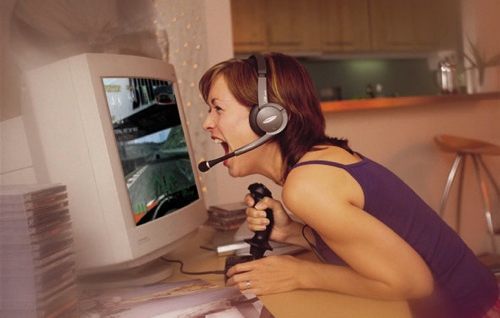The thing I am trying to aim at is the fun in games. I did not experience it in quite popular titles I played the last months. Its presence is so self-evident that people forget to check if it is in their game or not. The problem in games is that fun does not equal addiction to a game. What makes the problem bigger is that fun is not quantifiable and other aspects on games are easier to pinpoint.
The problem is made even bigger by the way the industry is constructed. At one end of the line is the reviewer (and vocal gamers with blogs or reviews at distributers etc.). The best way they can pinpoint fun is with phrases along the lines of "I had a blast with this game" or "It might be fun for fans of the genre, but not me". Reviewers are far to often very keen to focus on game features, the quality of graphics, the way a story develops or the integrity of the program. While these might be things that spoil fun when done wrong, they don't necessarily create fun when done right.
At the other end of the line is the developer. This party needs to make money and wants the player to be hooked as much as possible. While fun might work, addiction is a stronger incentive and easier to achieve. Addiction is formed by shaping the game in such a way that the player receives a reward at the right time when playing the game. Over time the rewards are harder to get, which makes the player work harder for his reward. The emphasis here is on work, I deliberately did not use the word 'play'. Rewards can be obvious, like unlocking new parts of the game, but also subtle, like praising the player for winning and booing him when he has lost. Also: showing a reward beforehand gives extra incentive.
 |
| Yay, fun! Now with CRT and joystick! |
The point is that the reward mechanics get in the way of the game. First of all, someone constantly shouting "you're doing great" might be a nice incentive, but becomes ridiculous when done on a low difficulty. An animated meter showing your progress in points might be handy, but gets annoying when a separate screen is used for it when you want to go to a next level and the animations takes too long. Cut scenes explaining your situation in the story or how you need to play the game might help game play and immersion, but are annoying again when too long in length and double annoying when not skippable. Also, I might be paranoid, but I've got the feeling that in some recent games the quit-button is hidden from me at times. (play Saints Row 2 and Split/Second for PC to know what I mean)
 |
| Dawww, isn't he cute? |
wide error ranges
A player should not be punished to redo a part of the game for a small error. To advance in the game no high standards should be expected from the player. Also the player must be well equipped for the game at hand. Bad examples: instakills, expecting a very fast race time to advance to the next track in a racing game, needing a ridiculous amount of shots to kill an enemy. Good example: grade while still progressing to unlock extra's that enhance game experience.
surprise, variety and juxtaposition
Monotony in grinding doesn't have to be a bad thing, but a surprise livens up a game. This can be an extremely powerful weapon or vehicle that makes the player dominate enemies for a short while or an extremely big enemy that suddenly bursts in the room. Common reactions should be along the lines of "ahahaha! How you like them apples" to "AAAAAAAAAAH, TAKE THAT! OH NO IT ONLY MADE IT ANGRIER!"
possibility to deviate
aka: the possibility to fuck around. A player should not only be able to win and finish the game in one specific way, this only creates frustration and gives a rat-in-a-maze feeling. A player should be able to create or choose his own style and he should be able to play with the game mechanics a bit. The best situation would be that the player can solve the game legitimately in a way the developer hasn't thought of.
These elements are just an hypothesis, but I hope to find some scientific work to either ground or alter them.

No comments:
Post a Comment